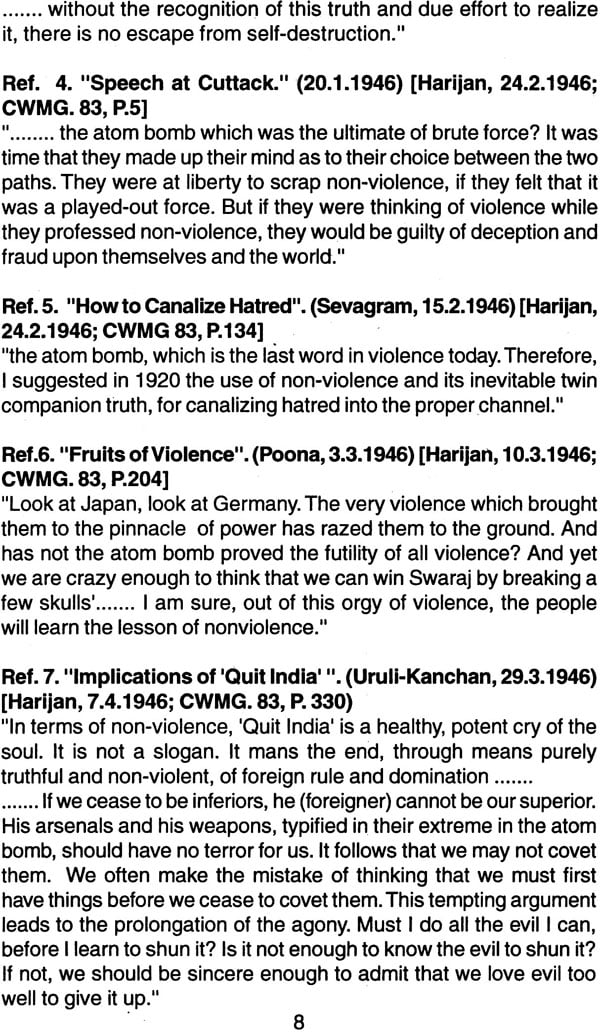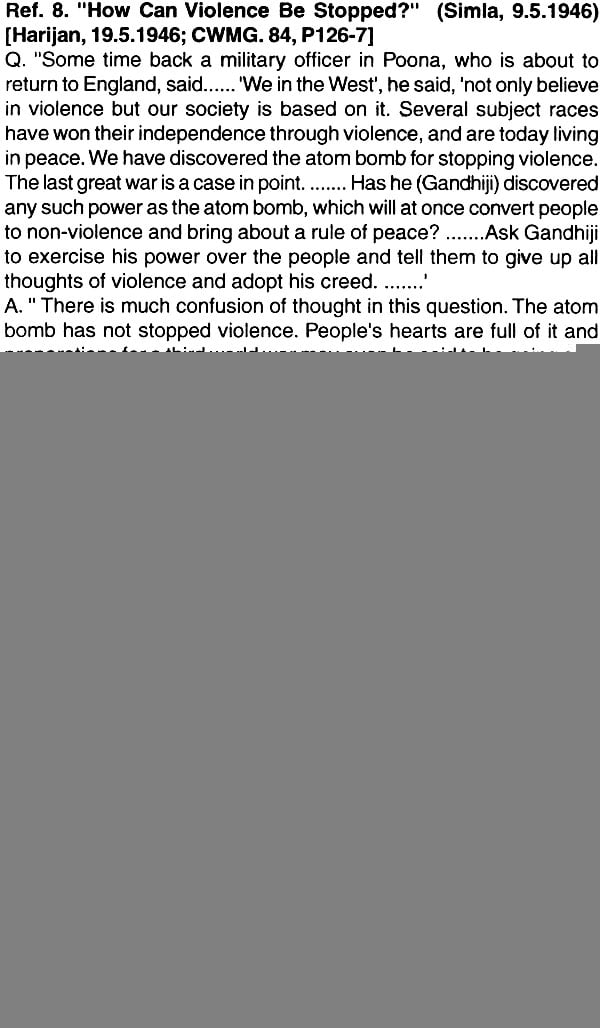
What Mahatma Gandhi Said About The Atom Bomb
Book Specification
| Item Code: | NAL013 |
| Author: | Dr. Y.P. Anand |
| Publisher: | National Gandhi Museum |
| Language: | English |
| Pages: | 16 |
| Cover: | Paperback |
| Other Details | 8.5 inch X 5.5 inch |
| Weight | 20 gm |
Book Description
Here is a compilation of Gandhiji's remarks on atom bomb made from time to time in the last years of his life. The atom bomb, the last word in violence and brutality was a fresh challenge to the Mahatma with his undying faith in truth and non-violence. He denounced it as the most "sinful and diabolical use of science." When Gandhiji spoke, America alone possesed the bomb and what is more, used it in the last year of the Second World War against Japan. The enormity of the destructive power of this new weapon brought about the quick surrender of Japan. Today five rich and developed nations of the world possess this lethal weapon in an enormous quantity. China joined this exclusive club in 1964. Surprisingly India and Pakistan too have joined the ranks in the year 1998. This happened when there was a world-wide effort to stop the further spread of nuclear weaponry. The effort was good but it suffered from the fatal defect of confirming the monopoly of the nuclear weaponry by nations which already possessed them. The nuclear tests by India have provoked reactions from several quarters of the world most of all from countries which possess the weapons and have no intention of parting with them in any forseable future. India and Pakistan have in the midst of controversy stood by their tests and have their own explanation to offer in justification of their course of action.
What Gandhiji said on atom bomb has its own significance for the whole humanity. Pledged as he was to truth and non-violence and having carried on several experiments in them, the first experiment in atom bomb by America could have been regarded as a grave set- back to non-violence, the creed to which he was steadfastly attached and in which he saw the cure of several maladies affecting mankind. Gandhiji had no such fear. On the contrary he thought that with this ultimate in violence confronting man, humanity, if it wished to save itself would have no alternative before it except the one he had presented to mankind. This might be so but what actually happened was its diffusion and spread to Russia and three other democratic or rather capitalist countries of the world. We have by now a massive quantity of this lethal weapon which, it is said, can destroy the world and humanity many times over. The atomic weapon has its fatal fascination for some other countries of the world. In terms of power China could not resist this fascination. It is now the turn of India to fall a victim to the fatal charm. Each country has a case to present to the world. India has to contend with dangers surrounding it in the international field. Pakistan has its own explanation to offer. We wonder if enough thought has gone into making the decision to go nuclear. It was unfortunate that on a weighty and vital matter like this one no effort to arrive at consensus could be made. The country and the world are now faced with an accomplished fact. There is much that can justifiably be said about the hypocrisy, duplicity and double standards of the West and the present possessors of the nuclear weapons. India however, has a distinctive role to play in history. Has this role been harmed or furthered by the nuclear option that we have now effectively closed.
Quite a few people have asked the National Gandhi Museum and Library what Gandhiji had thought and said on this all important subject. This little pamphlet in which my colleague, Dr. Anand, the Director of the National Gandhi Museum and Library has diligently sought out all the pregnant comments Gandhiji made on the atom bomb is our answer. The atom bomb had, when Gandhiji was alive, not assumed grave dimensions it has now acquired. The reader, we hope, will read this compilation with much interest The subject will remain alive till the atom bomb is effectively eliminated from the armoury of mankind.
The sudden announcement on 11th May 1998, that India had conducted three nuclear tests at Pokhran, came as a stunning bolt from the blue to everyone in India and abroad. India had conducted its first nuclear test 24 years earlier in 1974 and the public had no inkling of any such thing coming up so all of a sudden. On 13th May 1998, India carried out two more nuclear tests. Pakistan, unable to contain itself, retaliated with a series of nuclear tests on 28th May and 30th May 1998. And thus had India and Pakistan declared with a bang the birth of the nuclear arms race in the Indian subcontinent. The first atomic bomb was tested by the USA on 16th July 1945. The USA dropped an atom bomb at Hiroshima on 6th August 1945 and another at Nagasaki on 9th August 1945, in Japan, even while Japan was preparing to surrender. In Hiroshima, 13 sq. kilometer area was devastated and over 2,00,000 of its 3,50,000 population killed; in Nagasaki, 6.7 sq. kilometer area was devastated and over 140,000 of its 2,70,000 population killed. The death toll due to delayed radioactive effects continues till now. Present nuclear arsenals of the acknowledged five nuclear nations (USA, Russia, UK, France, China) are equivalent to over a million times of the Hiroshima bomb and can destroy the human civilization many times over!
While it may be argued that India has taken this precipitate action on account of the hypocrisy of the five. nuclear nation s who, instead of working for nuclear disarmament, have all along insisted on dividing the world between nuclear haves and nuclear have-nots, still I could not see, why India and Pakistan had to join in this devilish dance of human death and destruction. In this hour of darkness and despair, I turned, for guidance and support, to what Mahatma Gandhi, Father of our Nation, had said about the 'atom bomb' after it had suddenly burst upon the world when dropped at Hiroshima and Nagasaki. I have located twenty-eight references, starting from December 1945 and going upto 30th January 1948 (the day he was martyred), wherein he has expressed himself consistently and absolutely unequivocally against the atom bomb. Relevant extracts from these references are placed, in a chronological order, after this introduction.
When Gandhiji first heard that the atom bomb had wiped out Hiroshima, he had said to himself, "unless now the world adopts non-violence, it will spell certain suicide for mankind." [Ref. 12] This is the quintessential Gandhian truth which remains as valid today as it was then.
We may summarise Gandhiji's views, as expressed in those 28 references, under the following broad statements. (serial numbers of relevant references are given within brackets)
Truth and non-violence are more powerful than the atom bomb. (2, 3, 11, 18,22)
Atom bomb is the weapon of ultimate brute force and destruction. (4,5,12)
Development of atom bomb represents the most sinful and diabolical use of science. (12, 19)
. Atom bomb mentality is immoral, unethical, addictive and only evil can come of it. (7, 9, 10, 15, 25)
Atom bomb only aggravates violence and never protects against it. It symbolises the futility of violence. (6, 8, 9, 16, 27)
Non-violence is the only antidote against atom bomb and the only way to canalize hatred and resolve conflicts. (1,5, 14,20,21,23, 24,26)
It is the duty of large nations, and all other nations, in the interest of world peace, to give up the atom bomb. (13,17,28)
This brief compilation is our humble contribution to the world-wide fight against the existence of nuclear arms and to the cause of peace against war, of brotherhood against hatred, of human equality against human exploitation, of truth against untruth, of non-violence against violence.
We are grateful to Navajivan Trust, Ahmedabad, for their kind permission to publish this document based on Gandhiji's writings.
| Foreword | 3 |
| Introduction | 5 |
| What Mahatma Gandhi said about the Atom Bomb | 7 |







